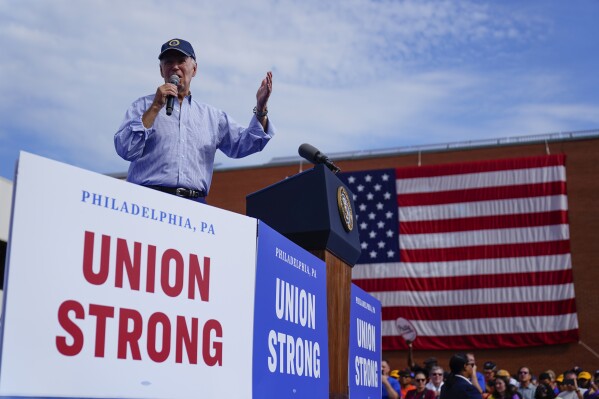UAW chief: Union to strike any Detroit automaker that hasn’t reached deal as contracts end next week
DETROIT (AP) — The head of the United Auto Workers warned Wednesday that the union plans to go on strike against any Detroit automaker that hasn’t reached a new agreement by the time contracts expire next week.
“That’s the plan,” President Shawn Fain responded when asked if the union would strike any of the companies that haven’t reached a tentative deal by the time their national contracts end.
A strike against all three major automakers — General Motors, Stellantis and Ford — could cause damage not only to the industry as a whole but also to the Midwest economy. A prolonged strike could lead eventually to higher vehicle prices.
In an interview with The Associated Press, Fain left open the possibility of avoiding a strike. He acknowledged, more explicitly than he has before, that the union will have to give up some of its demands to reach agreements. Contracts with the three companies will all expire at 11:59 p.m. Sept. 14.
 Hollywood strike stings Warner Bros., profit outlook for the year trimmed by as much as $500 million
Hollywood strike stings Warner Bros., profit outlook for the year trimmed by as much as $500 million
 Biden celebrates unions and job creation during a Philadelphia Labor Day appearance
Biden celebrates unions and job creation during a Philadelphia Labor Day appearance
 UAW’s clash with Big 3 automakers shows off a more confrontational union as strike deadline looms
UAW’s clash with Big 3 automakers shows off a more confrontational union as strike deadline looms
“There’s a lot of back and forth in bargaining,” he said, “and naturally, when you go into bargaining, you don’t always get everything you demand. Our workers have high expectations. We made a lot of sacrifices going back to the economic recession.”
In the interview, Fain did report some progress in the negotiations, saying the union will meet Thursday with GM to hear the company’s response to the UAW’s economic demands. In addition, discussions are under way with Ford on wages and benefits. Stellantis, formerly Fiat Chrysler, has yet to make a counteroffer on wage and benefit demands, he said.
Stellantis declined to comment Wednesday.
The union’s demands include 46% across-the-board pay raises, a 32-hour week with 40 hours of pay, restoration of traditional pensions for new hires, union representation of workers at new battery plants and a restoration of traditional pensions. Top-scale UAW assembly plant workers make about $32 an hour, plus annual profit sharing checks.
In his remarks to the AP, Fain argued that worker pay isn’t what has driven up vehicle prices. The average price of a new car has leaped to more than $48,000 on average, in part because of still-scarce supplies resulting from a global shortage of computer chips.
“In the last four years, the price of vehicles went up 30%,” he said. “Our wages went up 6%. There were billions of dollars in shareholder dividends. So our wages aren’t the problem.”
While saying a strike by up to 146,000 members against all three major automakers is a real possibility, Fain said the union doesn’t want to strike and would prefer to to reach new contracts with them.
Disclaimer: The copyright of this article belongs to the original author. Reposting this article is solely for the purpose of information dissemination and does not constitute any investment advice. If there is any infringement, please contact us immediately. We will make corrections or deletions as necessary. Thank you.





